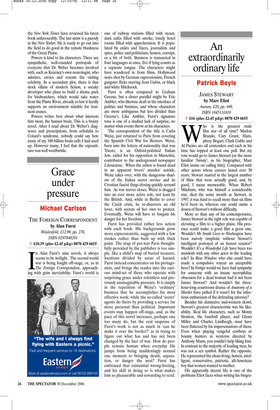Grace under pressure
Michael Carlson
THE FOREIGN CORRESPONDENT by Alan Furst Weidenfeld, £12.99, pp. 278, ISBN 0297848291 ✆ £10.39 (plus £2.45 p&p) 0870 429 6655 In Alan Furst’s nine novels, it always seems to be twilight. The second world war is being fought off-stage, or, as in The Foreign Correspondent, approaching with grim inevitability. Furst’s world is one of railway stations filled with steam, dark cafés filled with smoke, lonely hotel rooms filled with apprehension. It is populated by exiles and fixers, journalists and spies, police and politicians, honest, corrupt, or a bit of both. Business is transacted in four languages at once, five if lying counts as a separate tongue. The characters might have wandered in from films, Hollywood noirs shot by German expressionists, French gangster flicks starring Jean Gabin, or black and white Hitchcock.
Furst is often compared to Graham Greene, but a closer parallel might be Eric Ambler, who likewise dealt in the interface of politics and business, and whose characters are more ambiguous but less divided than Greene’s. Like Ambler, Furst’s signature tone is one of a studied lack of surprise, no matter what events throw at his characters.
The correspondent of the title is Carlo Weisz, just returned to Paris from covering the Spanish Civil War for Reuters. Weisz, born into the lottery of nationality that was Trieste, is an Oxford-polished Italian Jew, exiled for his opposition to Mussolini, contributor to the underground newspaper Liberazione. When the editor is found dead in an apparent lovers’ murder/ suicide, Weisz takes over, with the dangerous shadow of the Italian secret service and its Croatian fascist thugs closing quickly around him. As war moves closer, Weisz is dragged into an ever more active role, not least by the British. And, while in Berlin to cover the Czech crisis, he re-discovers an old lover, with secrets of her own to protect. Eventually, Weisz will have to bargain his danger for her freedom.
Furst has provided rather less action with each book. His backgrounds grow more expressionistic, suggested with a few strokes rather than built up with thick paint. The map of pre-war Paris thoughtfully provided by the publisher is too simple, like a child’s map of buried treasure, locations divided by areas of hazard. Furst instead concentrates on his protagonists, and brings the reader into the curious mind-set of those who operate with surprising grace under relentless and previously unimaginable pressure. It is simply in the repetition of Weisz’s ‘ordinary’ business that he accomplishes his most effective work; while the so-called ‘secret’ agents do theirs by providing a service far more personal than political. Important events may happen off-stage, and, as the pace of this novel increases, perhaps one too many do, but the real suspense of Furst’s work is not as much in ‘can he make it over the border?’ as in trying to figure out what has and has not been changed by the face of war. How do people remain human when everyday life jumps from being maddeningly normal one moment to bringing death, separation, or danger the next? Furst has embraced that existential wrong-footing, and his skill in doing so is what makes him so pleasurable and rewarding to read.




































 Previous page
Previous page